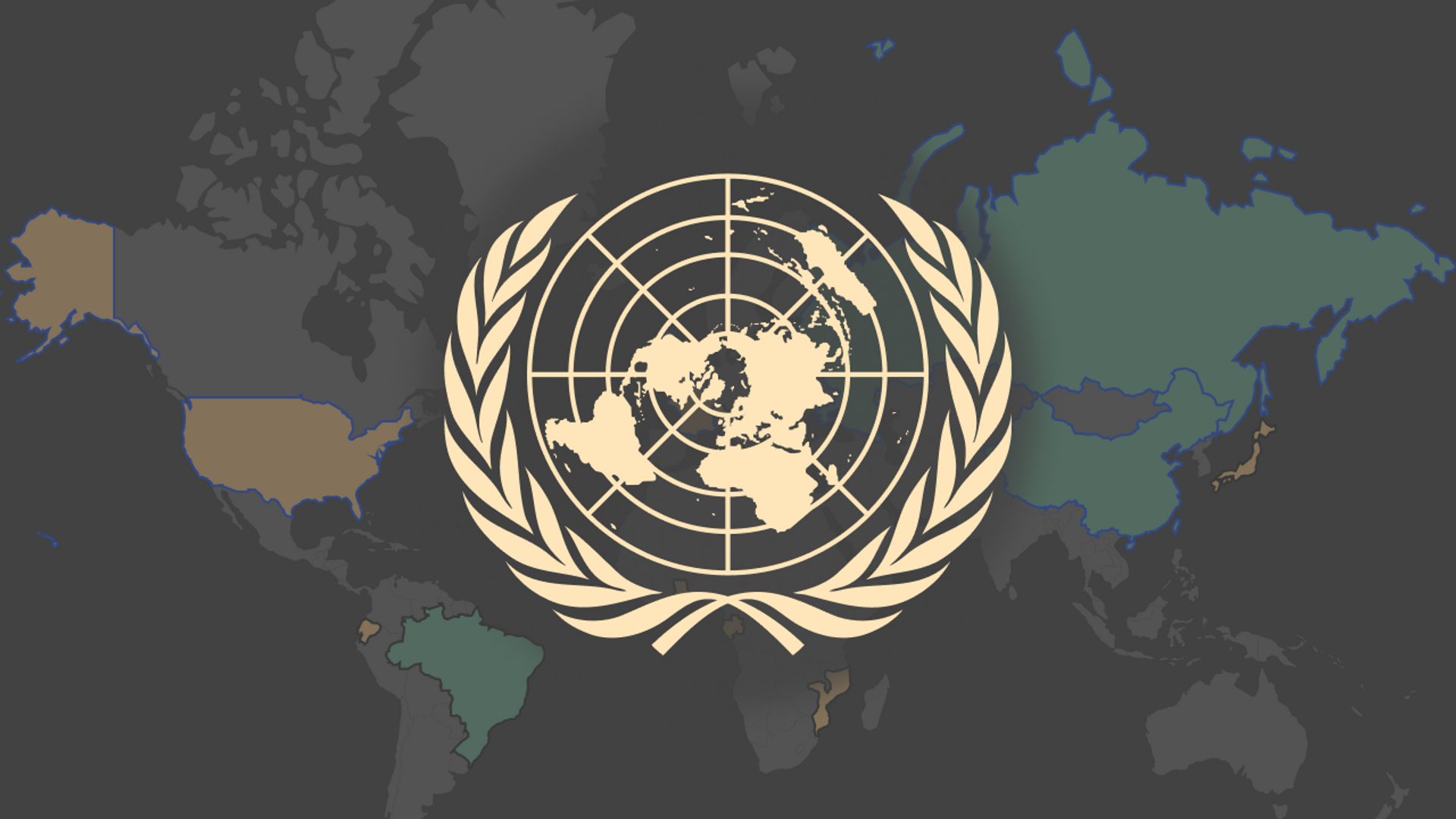https://sputniknews.in/20230922/g4-urges-unsc-expansion-african-nations-inclusion--4380637.html
G4 Urges UNSC Expansion, African Nations' Inclusion
G4 Urges UNSC Expansion, African Nations' Inclusion
Sputnik India
The G4 partipants during the meet agreed that developing nations should play a bigger role, and be more involved in the Security Council, both as permanent and... 22.09.2023, Sputnik India
2023-09-22T14:10+0530
2023-09-22T14:10+0530
2023-09-22T15:11+0530
india
germany
un security council (unsc)
unga
diplomatic row
the united nations (un)
s. jaishankar
japan
brics
world news
https://cdn1.img.sputniknews.in/img/07e7/09/16/4382385_0:0:1280:720_1920x0_80_0_0_edac8dbe2bf306d44f04e10a68933d31.png
The G4 nations - Germany, Brazil, Japan and India - reaffirmed their support for each other's efforts to become permanent members of the UNSC and for the inclusion of African nations.The United Nations Reform has been one of the central themes of Indian Prime Minister Narendra Modi's visit during the 15th BRICS Summit in South Africa this year. Modi, during the tour, emphasised on undertaking reforms of the United Nations Security Council (UNSC).Last year, in 2022, Indian External Affairs Minister S. Jaishankar visited the UN to meet with his counterparts from Germany, Brazil, and Japan under The Group of Four (G4). He primarily also focused on UNSC reform, and favoured permanent membership of the G4 in the international body, among other things.Meanwhile, on Thursday, on the sidelines of the 78th session of the UN General Assembly (UNGA), the foreign ministers of the G4 countries met and spoke about the UN Security Council reforms.Participating in the meeting, Brazilian Foreign Minister Mauro Vieira, German Foreign Minister Annalena Baerbock, Japanese Foreign Minister Yoko Kamikawa and Indian Foreign Secretary (West) Sanjay Verma discussed the progress of the reform negotiations.The ministers have emphasized the crucial importance of increasing both the permanent and non-permanent memberships of the UNSC. This expansion is essential to enhance the legitimacy, effectiveness, and efficiency of the organization.They agreed that developing countries should play a greater role and be more involved in the Security Council, both as permanent and non-permanent members.Ministers also stressed the importance of increasing the participation of underrepresented and unrepresented groups and regions, such as Africa, Latin America and the Caribbean.Meanwhile, the ongoing lack of substantive progress on Security Council reform in the scope of inter-governmental negotiations also drew sharp criticism from the G4 foreign ministers.“In this light, the Ministers acknowledged the Co-Chair's suggestion for a structured debate on specific models submitted by States and Groups and welcome continued efforts by the PGA and the Co-Chairs to initiate text-based deliberations in the IGN without any further delay,” the statement added.In doing so, they "emphasised the significance of adhering to the requirements for decision-making and working procedures laid out in the Charter of the United Nations and the rules and procedures of the General Assembly," the statement continued. "They reaffirmed their commitment to discuss the matter at the upcoming 78th Session of the UNGA and agreed to intensify dialogue with all Member States, with an aim to achieve concrete results within a fixed time frame."The G-4 foreign ministers strongly criticized the lack of significant progress in Security Council reform during the intergovernmental negotiations.The statement added that "they reaffirmed their commitment to discuss the matter at the upcoming 78th Session of the UNGA and agreed to intensify dialogue with all Member States, with an aim to achieve concrete results within a fixed time frame."The participating ministers reaffirmed their support for each other's candidacies for new permanent seats on the Security Council, which they sought to establish through an open, democratic and transparent process in accordance with the UN Charter."The ministers emphasised that the ability of global governance mechanisms to adapt and continue serving their intended purposes is crucial to their future. The UN Security Council's effectiveness will be questioned the longer it takes to change,'' the statement said.
india
germany
japan
Sputnik India
feedback.hindi@sputniknews.com
+74956456601
MIA „Rossiya Segodnya“
2023
Swapna Nair
https://cdn1.img.sputniknews.in/img/07e7/09/12/4320104_0:0:681:681_100x100_80_0_0_ca8a7d4d582609272840ffdd1cde7278.jpg
Swapna Nair
https://cdn1.img.sputniknews.in/img/07e7/09/12/4320104_0:0:681:681_100x100_80_0_0_ca8a7d4d582609272840ffdd1cde7278.jpg
News
en_IN
Sputnik India
feedback.hindi@sputniknews.com
+74956456601
MIA „Rossiya Segodnya“
Sputnik India
feedback.hindi@sputniknews.com
+74956456601
MIA „Rossiya Segodnya“
Swapna Nair
https://cdn1.img.sputniknews.in/img/07e7/09/12/4320104_0:0:681:681_100x100_80_0_0_ca8a7d4d582609272840ffdd1cde7278.jpg
g4 nations, germany, brazil, japan, and india, unsc, african nations, brazilian foreign minister mauro vieira, german federal foreign minister annalena baerbock, japanese foreign minister yoko kamikawa, and indian ministry of external affairs secretary (west) sanjay verma, security council, africa, latin america and the caribbean, common african position (cap), ezulwini consensus and the sirte declaration, foreign ministers, pga and the co-chairs, 78th session of the unga, international peace and security, un charter.
g4 nations, germany, brazil, japan, and india, unsc, african nations, brazilian foreign minister mauro vieira, german federal foreign minister annalena baerbock, japanese foreign minister yoko kamikawa, and indian ministry of external affairs secretary (west) sanjay verma, security council, africa, latin america and the caribbean, common african position (cap), ezulwini consensus and the sirte declaration, foreign ministers, pga and the co-chairs, 78th session of the unga, international peace and security, un charter.
G4 Urges UNSC Expansion, African Nations' Inclusion
14:10 22.09.2023 (Updated: 15:11 22.09.2023) The G4 partipants during the meet agreed that developing nations should play a bigger role, and be more involved in the Security Council, both as permanent and non-permanent members.
The G4 nations - Germany, Brazil, Japan and India - reaffirmed their support for each other's efforts to become permanent members of the UNSC and for the inclusion of African nations.
The United Nations Reform has been one of the central themes of Indian Prime Minister Narendra Modi's visit during the 15th BRICS Summit in South Africa this year. Modi, during the tour, emphasised on undertaking reforms of the United Nations Security Council (UNSC).
“India believes that reforms in the UN Security Council are a necessity, and in this matter, India expects the support of BRICS partner countries. Besides the UN, there are a number of international organizations that are not working according to the current realities. The WTO, the International Monetary Fund, and the World Health Organization should also undergo reforms," he stated last month during the summit.
Last year, in 2022, Indian External Affairs Minister S. Jaishankar visited the UN to meet with his counterparts from Germany, Brazil, and Japan under The Group of Four (G4). He primarily also focused on UNSC reform, and favoured permanent membership of the G4 in the international body, among other things.
Meanwhile, on Thursday, on the sidelines of the 78th session of the UN General Assembly (UNGA), the foreign ministers of the G4 countries met and spoke about the UN Security Council reforms.
Participating in the meeting, Brazilian Foreign Minister Mauro Vieira, German Foreign Minister Annalena Baerbock, Japanese Foreign Minister Yoko Kamikawa and Indian Foreign Secretary (West) Sanjay Verma discussed the progress of the reform negotiations.
The ministers have emphasized the crucial importance of increasing both the permanent and non-permanent memberships of the UNSC. This expansion is essential to enhance the legitimacy, effectiveness, and efficiency of the organization.
They agreed that developing countries should play a greater role and be more involved in the Security Council, both as permanent and non-permanent members.
Ministers also stressed the importance of increasing the participation of underrepresented and unrepresented groups and regions, such as Africa, Latin America and the Caribbean.
"In this context, the G4 Ministers reaffirmed their strong support for the Common African Position (CAP) and emphasised that Africa must be represented in both the permanent and non-permanent categories of membership of a reformed and expanded Security Council, in line with the CAP as enshrined in the Ezulwini Consensus and the Sirte Declaration," a joint statement said.
Meanwhile, the ongoing lack of substantive progress on Security Council reform in the scope of inter-governmental negotiations also drew sharp criticism from the G4 foreign ministers.
“In this light, the Ministers acknowledged the Co-Chair's suggestion for a structured debate on specific models submitted by States and Groups and welcome continued efforts by the PGA and the Co-Chairs to initiate text-based deliberations in the IGN without any further delay,” the statement added.
In doing so, they "emphasised the significance of adhering to the requirements for decision-making and working procedures laid out in the Charter of the United Nations and the rules and procedures of the General Assembly," the statement continued. "They reaffirmed their commitment to discuss the matter at the upcoming 78th Session of the UNGA and agreed to intensify dialogue with all Member States, with an aim to achieve concrete results within a fixed time frame."
The G-4 foreign ministers strongly criticized the lack of significant progress in Security Council reform during the intergovernmental negotiations.
The statement added that "they reaffirmed their commitment to discuss the matter at the upcoming 78th Session of the UNGA and agreed to intensify dialogue with all Member States, with an aim to achieve concrete results within a fixed time frame."
The participating ministers reaffirmed their support for each other's candidacies for new permanent seats on the Security Council, which they sought to establish through an open, democratic and transparent process in accordance with the
UN Charter."The ministers emphasised that the ability of global governance mechanisms to adapt and continue serving their intended purposes is crucial to their future. The UN Security Council's effectiveness will be questioned the longer it takes to change,'' the statement said.


